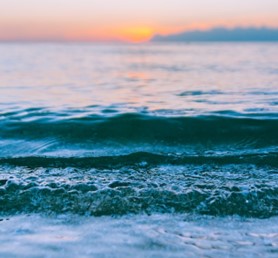Martha Saunders is a professor at the University of West Florida, who also works as a community volunteer, and is a contributor to various publications in her field. On top of this, Martha embodies a deep passion for the world's oceans and is on a mission to raise awareness about ocean health, inspiring others to join the cause. In the following article, Martha Dunagin Saunders uncovers the vital work caring for these waters involves, as well as the urgent need to protect and restore our fragile underwater world.
Humans may live on land, but our species could never survive without the planet's oceans and the aquatic life it sustains. But what makes our oceans so important?
Oceans play a critical role in maintaining our planet's ecosystems, regulating on-land temperatures, and supplying oxygen. They are also an important source of affordable and nutritious food worldwide. Directly or indirectly, every sector of the human economy depends on ocean-based resources, transportation, travel, and tourism.
Martha Dunagin Saunders observes that amidst our mounting plastic waste, devastating oil spills, unsustainable overfishing practices, and environmentally detrimental habits such as deep-sea mining, our actions betray a lack of reverence for the oceanic realm. Below is an examination of the multitude of invaluable gifts bestowed upon us by the oceans. Furthermore, Martha dives into the imperative task of nurturing and safeguarding these life-sustaining waters, recognizing the interdependence between our own existence and the well-being of our aquatic ecosystems.
Martha Saunders of the University of West Florida explains that the oceans play a vital role in temperature regulation by carrying heat from the equator toward the poles. Since the Industrial Revolution, the global rise in greenhouse gasses has continued to trap dangerous levels of heat in the atmosphere, which the ocean then distributes across the earth's surface.
The oceans have absorbed 20-30% of these harmful emissions, but they can't save us from ourselves, especially as we continue depleting the ecosystems they sustain by overfishing, destroying coastlines, killing coral reefs and polluting their waters.
When it comes to food, the ocean is rich in both quantity and variety. On the pricier side of the scale, lobster, salmon, and caviar are often served at formal events. As for more common dishes, fish and chips is an iconic casual meal in England and Australia and fish is also used in cultural and regional specialties throughout the world.
Even those who don't consume animal products likely consume ocean-growing seaweed either as food or as a key ingredient in many vegan-friendly dietary supplements.
Martha Dunagin Saunders notes that given the ecological damage caused by raising, processing and transporting livestock, the ocean may take on a new significance as we struggle to feed a rapidly increasing human population. When sourced responsibly, seafood is often a far more sustainable and health-promoting protein choice than other meat and dairy products.
 Oceans and the Economy
Oceans and the EconomyMartha Dunagin Saunders says that while cruises, beach-going, snorkeling, surfing, scuba diving and boating may be some of the first activities that come to mind, even making it a priority to try local specialties such as Spanish paella, Japanese sushi and Australian shrimp on the barbie depend on the ocean.
Economies in even the most land-locked locations are often kept afloat by the ocean, which is used for transporting most consumer goods, raw materials and imported foods. Research teams, engineers and medical practitioners also may rely heavily on the ocean for work, not to mention most retailers.
Here are a few of the simplest ways we can reduce our carbon footprint:
Although big changes often start small and every individual effort counts, protecting our oceans will take more than a few people making small adjustments. Addressing the problem more fully will require local, state, national and international organizations, and governments to make ocean protection a top priority.
Until governments create legal penalties for industries that continue their ecologically harmful actions, change is likely to move slowly, allowing this global crisis to fester and grow. Petitioning for change and voting for representatives who favor environmental protection can help take protecting our oceans off the political backburner and make them a global priority.
Martha Saunders of the University of West Florida says that with environmental crises continuing to grow, it is our responsibility as world citizens to alter our destructive behaviors and shift our priorities to reduce our emissions, resource consumption and waste while also encouraging others to do the same. Fixing this global crisis will require global participation, and the sooner we can take action, the better.